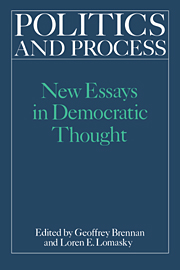Book contents
- Frontmatter
- Contents
- Acknowledgments
- List of contributors
- Introduction
- Chapter 1 The justification of democracy
- Chapter 2 Large numbers, small costs: the uneasy foundations of democratic rule
- Chapter 3 Evaluating the institutions of liberal democracy
- Chapter 4 Democracy: the public choice approach
- Chapter 5 The democratic order and public choice
- Chapter 6 Radical federalism: responsiveness, conflict, and efficiency
- Chapter 7 Contractarian presuppositions and democratic governance
- Chapter 8 In quest of the social contract
- Chapter 9 Rationality and the justification of democracy
- Chapter 10 The morality of democracy and the rule of law
- Index
Chapter 3 - Evaluating the institutions of liberal democracy
Published online by Cambridge University Press: 29 September 2009
- Frontmatter
- Contents
- Acknowledgments
- List of contributors
- Introduction
- Chapter 1 The justification of democracy
- Chapter 2 Large numbers, small costs: the uneasy foundations of democratic rule
- Chapter 3 Evaluating the institutions of liberal democracy
- Chapter 4 Democracy: the public choice approach
- Chapter 5 The democratic order and public choice
- Chapter 6 Radical federalism: responsiveness, conflict, and efficiency
- Chapter 7 Contractarian presuppositions and democratic governance
- Chapter 8 In quest of the social contract
- Chapter 9 Rationality and the justification of democracy
- Chapter 10 The morality of democracy and the rule of law
- Index
Summary
My topic is the evaluation of democracy. By “democracy” I mean representative government of the kind found in most countries in North America and Western Europe. It is not that I think this the only possible or only correct meaning of “democracy.” It is a simplifying assumption, a stipulation. I make it simply because I believe that, for many people at least, it is the evaluation of this kind of government that is of interest, whether or not it is, by somebody's definition, real democracy, much less the only kind of government properly called “democratic.”
When we evaluate democracy, we are evaluating a system of institutionalized authority. The issue is one of institutional design. When we adopt political institutions — a legislative procedure, for example — we run a risk that it will yield bad legislation. This will be true no matter what standard we use for assessing legislation, and it will be true of democratic as well as nondemocratic procedures. There is nothing magic about democratic procedures. This is not to say that democratic procedures have no advantage over others. We simply question what these advantages are and what disadvantages remain. Well worked out answers to these questions, relative to some specific kind of democratic system, should be of interest practically as well as theoretically, for, among other things, they can point the way toward desirable reforms.
- Type
- Chapter
- Information
- Politics and ProcessNew Essays in Democratic Thought, pp. 60 - 77Publisher: Cambridge University PressPrint publication year: 1989
- 3
- Cited by

